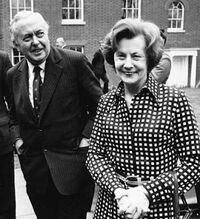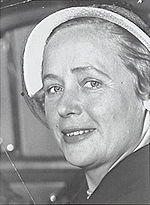New Kingdom: Difference between revisions
(Created page with "thumb|right|200px|The "blue eagle" (''blå ørn'') logo of the National Industrial Administration, an iconic symbol of the New Kingdom The '''New King...") |
mNo edit summary |
||
| Line 1: | Line 1: | ||
[[File: | [[File:NewKingdomEagle.png|thumb|right|200px|The "blue eagle" (''blå ørn'') logo of the National Industrial Administration, an iconic symbol of the New Kingdom]] | ||
The '''New Kingdom''' ({{wpl|Danish language|Delkoran}}: ''Det nye rige'') refers to a set of domestic programs and far-reaching reforms in [[Delkora]] carried out by [[National Labor]] from 1959 to 1983. Responding to the [[Economy of Delkora#Economic liberalization and depression|1953 Banking Crisis and subsequent depression]], the governments of [[Mette Elvensar]] and [[Geirbjørn Feldengaard]] enacted an ambitious agenda focused on recovery and long-term structural changes. These included dramatic expansion of the {{wpl|welfare state}}, aggressive {{wpl|nationalisation}}s, expansion of {{wpl|economic planning}}, long-term {{wpl|social ownership|socialisation}} and {{wpl|cooperative}} growth, strengthening {{wpl|organised labour}} and {{wpl|workers' self-management}}. | The '''New Kingdom''' ({{wpl|Danish language|Delkoran}}: ''Det nye rige'') refers to a set of domestic programs and far-reaching reforms in [[Delkora]] carried out by [[National Labor]] from 1959 to 1983. Responding to the [[Economy of Delkora#Economic liberalization and depression|1953 Banking Crisis and subsequent depression]], the governments of [[Mette Elvensar]] and [[Geirbjørn Feldengaard]] enacted an ambitious agenda focused on recovery and long-term structural changes. These included dramatic expansion of the {{wpl|welfare state}}, aggressive {{wpl|nationalisation}}s, expansion of {{wpl|economic planning}}, long-term {{wpl|social ownership|socialisation}} and {{wpl|cooperative}} growth, strengthening {{wpl|organised labour}} and {{wpl|workers' self-management}}. | ||
Revision as of 08:06, 23 December 2020
The New Kingdom (Delkoran: Det nye rige) refers to a set of domestic programs and far-reaching reforms in Delkora carried out by National Labor from 1959 to 1983. Responding to the 1953 Banking Crisis and subsequent depression, the governments of Mette Elvensar and Geirbjørn Feldengaard enacted an ambitious agenda focused on recovery and long-term structural changes. These included dramatic expansion of the welfare state, aggressive nationalisations, expansion of economic planning, long-term socialisation and cooperative growth, strengthening organised labour and workers' self-management.
The program produced a permanent transformation of the economy along democratic socialist models, and was complemented by similarly wide-ranging social and cultural liberalisation, spearheaded by the '65 Generation. It achieved unprecedented redistribution of wealth and great increases in quality of life, particularly in health, education, well-being, and social development.
The era saw a political realignment within the third party system. Buoyed by the "Elvensar Coalition", National Labor enjoyed a period of hegemony at the federal and state levels, in close collaboration with the Liberal Party, while the former Conservative–Agrarian coalition was decimated, spending two decades in the political wilderness due to its association with the 1950s depression. Other New Left and far-left forces emerged that sought to deepen the New Kingdom's transformation, such as the Radical Front and Greens.
The era ended in 1983, after which Conservative governments of Lars af Vellarand and Ulrik Andersen tried the New Kingdom programs, largely without success. Many of the achievements of the New Kingdom have been enshrined in the constitution by the Economic Rights Amendment of 1976, and have been continued or expanded under subsequent governments.
Background
The 1940s were marked by the right-wing economic policies of Chancellor Veidnar Albendor, which included tax and spending cuts, deregulation, and cuts to social security and public services. The result was skyrocketing inequality, a massive transfer of wealth to the upper classes, and the rise of oligopolies. A severe recession struck in the early 1950s, which turned into a depression after the 1953 Banking Crisis.
The economic collapse was inflamed by the government's response, which bailed out the largest employers at the cost of wage cuts. With the banking sector devastated, growing poverty, and unemployment hitting a peak of 25%, the country erupted into revolt. Civil unrest and protests spread, the General Labor Confederation of Delkora declared a general strike, and the Labor Underground launched a guerrilla warfare campaign. The government deployed troops to restore order. When Hjalmar Madsen was assassinated in 1959, there were fears a new civil war was imminent.
Discredited by the depression and widespread unrest, the Conservative–Agrarian coalition was devastated in the 1959 federal election. National Labor successfully channelled public discontent and won a landslide victory, gaining the first single-party majority since the introduction of proportional representation in 1884.
Leadership
Two crucial figures in National Labor during the New Kingdom were Mette Elvensar and Geirbjørn Feldengaard, who headed the governments during the period. They had contrasting styles: Elvensar was known as a strong-willed agitator and an exceptional public speaker and performer, while Feldengaard cultivated a "man of the people" image and did better behind-the-scenes. The two formed a close relationship, and their seasoned collaboration was crucial to the reform of National Labor and its preparations for office.
The phrase "new kingdom" had a history in Delkoran politics, being used by reformist groups like the Jaerevik clique and the Progressive Party to attack the "old regime" of aristocratic privilege and undemocratic rule. However, Elvensar made it a centrepiece of the party's 1959 campaign, and matched it to a suitably ambitious agenda that resonated with voters desperate for an end to the depression. The successful reappropriation led to a distinction among historians between older calls for a "new kingdom" and "The New Kingdom" — capitalised — as the domestic program that defined the era.
While National Labor enjoyed a single-party majority until 1975, Elvensar was sensitive to symbolism and made it a priority to maintain close ties with the Liberal Party, to strengthen the program's unifying perception. Osvald Bjerg led the Liberals throughout the period and can be considered a significant "outside supporter" of the New Kingdom. Feldengaard similarly sensed shifting tides and sought to reach out to the Greens as they started to make their presence felt in Parliament.
Legislation and programs
Economy
National Labor's economic policy had two aims: ending the depression, and achieving a fundamental transformation of the economy.
The first matter took priority during Elvensar's first term. Immediate relief was introduced in the form of expanded social security, emergency houing, aid to farmers, rent controls, and the reintroduction of the minimum wage, abolished by Albendor. An aggressive nationalisation push brought numerous failing corporations into public ownership, transforming them into government enterprises. The public sector was greatly expanded, with numerous administrative agencies being created. One of the most important was the Federal Public Works Commission, whose projects provided a national job guarantee.
The use of deficit spending, public works, and emergency relief succeeded in halting the economic collapse. The economy began to recover and unemployment decline. The government thus moved to the second phase of its program.
The Cooperative Economy Act of 1965 expanded co-determination and began a long-term transfer of economic ownership to workers and social ownership. The tax code was amended to encourage cooperatives, and progressive tax rates were hiked to fund public services and reduce inequality. Profits from government enterprises were redirected to a social dividend in 1972.
Two influential figures in the government's economic policy were finance minister Harald Henriksen and Eudoxia Pedersen, the head of the National Industrial Administration. Pedersen was a strong advocate of economic planning and believed an incomes policy would aid the transition away from capitalism. Through the NIA, she brought together labour, industry, and government to create codes of fair practices and set prices. It was used in conjunction with the Hermes Programme to strengthen workers' self-management, break up big businesses, and try to achieve competing priorities of higher wages, minimum prices, improved standards of living, and full employment.
Pedersen was notable as one of the radical voices within National Labor, placing herself in opposition to the more conservative faction led by Annie Römheld. Her unique mixture of socialism and corporatism led her to advocate guild socialism; this was perceived by many as more of an eccentric attempt to reconcile Megelanese guilds and Akashian state-led development. However, the party declined to follow her path, and after the economic transformation bore fruit, the NIA was split into the Office of Economic Planning and Competition Enforcement Board in 1976.
Society
The 1960s–1970s saw the rise of the modern Delkoran welfare state, through the expansion of social security programs and an increase in funding. The social dividend became a cornerstone of social security. Funding for public education was greatly increased. The Public Health Act of 1963 nationalised the remaining private health providers and phased out user fees, and Healthcare Profiteering Act of 1974 banned private health insurance outright. Housing first policies in conjunction with public works brought a great increase in public housing stock.
The New Kingdom was an era of extraordinary wage compression and redistribution of wealth. Poverty declined drastically, average incomes grew significantly, and the gap between rich and poor reached its lowest point since the Industrial Revolution. The power of organised labour was reflected in the replacement of minimum wages with national collective bargaining and income policy agreements. The government introduced a sliding wage scale in 1970, automatically indexing wages and pensions to inflation. The Economic Rights Amendment of 1976 enshrined numerous economic rights in the federal constitution.
The prosperity of the period coincided with a pronounced social liberalisation and secularisation, driven in part by the '65 Generation. Reforms transformed or weakened traditional social institutions like the nobility and Vallyar Order. Broadcast standards were relaxed. The voting age was reduced. Attitudes towards artistic freedom and sexuality grew more liberal, while a counterculture emerged that took even more radical libertarian stances towards sexuality and drugs. While Feldengaard's government took credit for these achievements, he personally showed no particular enthusiasm for this agenda, which was advanced more by others like his minister of justice, culture minister Chantal Beaumont, and the NK Group at the DBS.
Immigration laws were relaxed, leading to an increase in ethnic diversity. Protections for minority languages were strengthened, particularly in education and local media. The Office of Romani Affairs was established for the needs of Travellers while the Office of Social Integration and Office for the Protection of Minorities were established to combat racism and discrimination.
The protests of 1968 brought greater attention to issues of discrimination and integration. They led to a heightening of redistributive policies and the introduction of desegregation busing and affirmative action.
Culture
The New Kingdom era saw a reinvigoration of Delkoran arts and culture. Increasing numbers of aspiring writers, artists, and musicians were able to devote themselves full-time to their pursuits, inducting a golden era of Delkoran film, literature, and music. This development was aided by a combination of direct government support for creative endeavors, increased leisure time resulting from an expanded welfare state and new labor policies, and shifting cultural attitudes that favored experimentation.
Delkorskfilm A/S, a film distribution and production company that had been founded in the 1930s as a public enterprise but later privatized, was brought back under government ownership in 1960 and returned to its founding mission of stimulating the Delkoran film industry. Olga Pilgaard, who had led the organization prior to its privatization, was brought back in and successfully rebuilt it into a major player in the film industry that forced private companies to compete.
Many of the cultural advancements of the period were led by the '65 generation, those coming of age around the time of the 1965 economic boom. Having been old enough to remember the worst of the 1950s depression and entering adulthood in the midst of the prosperity created by the New Kingdom, members of this generation are commonly defined by sociologists by a deep-seated belief in the potential for progress and an attendant readiness to challenge prevailing cultural customs.
Political effects
The New Kingdom brought about the "Elvensar Coalition", a radical expansion of National Labor's voter base that fueled a period of political hegemony. National Labor was re-elected with single-party majorities in 1963, 1967, and 1971 — all elections where the Liberals finished second and ostensibly formed the official opposition while operating an unofficial coalition.
The alliance was also ascendant in the states. During the 1960s–1970s, all states but Vassengård had National Labor or Liberal first ministers. Vassengård was governed by the progressive conservative <Jerry Ford>, who supported the New Kingdom and collaborated with the federal government to deliver its programs.
Relegated to the political wilderness throughout the era, the Conservative Party was torn by factional battles between moderates and hardliners. In Cybria, the Conservatives' right-wing faction broke off to form the Party of Ordinary Delkorans.
Although National Labor appeared dominant, it too wrestled with internal arguments between the conservative faction and the more radical left faction, which thought of the New Kingdom as merely a starting point for more radical transformations.



